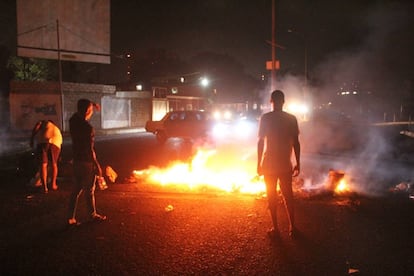Daily power cuts raise the tension in embattled Venezuelan city
Residents of Maracaibo have to deal with ransacked businesses, suspended classes and streets under army control


Villa Luz (Light City), a residential community in Ciudad Lossada, is not the bright place that it used to be.
Residents of this suburb of Maracaibo, the capital of the state of Zulia, in western Venezuela, say that some nights they feel downright blind.
“If we don’t have candles, cellphones or flashlights, we are forced to feel our way around so as not to trip and fall. There have been many days without light,” says Ismary Gutiérrez .
Inflation and more economic losses
The power cuts are threatening to make Venezuela’s economic crisis even worse. At a time when the International Monetary Fund is forecasting an inflation rate of 700% by the end of this year, the Federation of Associations and Chambers of Commerce and Production figures that the daily four-hour power cuts over the course of 40 days will cause incalculable losses to production.
The Maduro administration is not only reducing electricity use; it has also shortened government workers' week to just two days, Mondays and Tuesdays. The country has even shifted time zones in an effort to save energy.
The situation has triggered a reaction by the international community, including the Vatican, where Pope Francis sent a personal letter to Nicolás Maduro expressing his concern for Venezuela.
Everyday life has already changed as a result of the nationwide daily power cuts ordered by President Nicolás Maduro to make up for the drought at the Guri water reservoir, which powers the nation’s main hydroelectricity dam.
The announcement was made on April 21 and the cuts are expected to remain in place for 40 days.
There are homes in La Pastora de Cañada Honda, north of Maracaibo, where residents are using firewood to cook, ice blocks to conserve meat and candles to see at night. Cristina Oyaga, who has two grandchildren, jokes about the adversity: “Maduro has taken us back to prehistoric times.”
In Zulia, the country’s main oil-producing state, the rationing has prompted protests. There are army-patrolled streets, broken glass in storefront windows, leftover barricades on the roads and groups of incensed individuals just waiting for the next power cut to create a new public disturbance.
The worst protests took place a week ago. In two days, street rioting in Maracaibo resulted in a threefold increase in the number of ransacked businesses since the previous Easter raid. The official count was 73 commercial premises broken into by groups of rioters. There were around 100 arrests.
The street revolts were put down on Wednesday by the army, which deployed thousands of soldiers in the area. But Maracaibo is still a rebel town. On Saturday, part of Avenue 18 was blocked by a group of women demonstrators who complained that the short-circuits had damaged their television sets, microwave ovens and refrigerators.
“Maduro has divided us into first- and second-class citizens,” said José Piña, one of the few men who took part in that march.
Caracas, Vargas and Nueva Esparta have been excluded from the four-hour daily power cuts. The government says this is because most of the country’s public powers and other major operation centers have their headquarters there.
The street revolts were put down by the army, which deployed thousands of soldiers in the area
In Maracaibo, the heat is overwhelming. The high temperatures have led to an excessive use of electricity to power air conditioners. El Sambil, the main shopping mall, closed its doors on Saturday due to the energy crisis, and no opening date has been announced.
The well-known business chain had so far resisted, but now it has temporarily halted all operations here and in two other locations, Táchira and Nueva Esparta. Early this year, the government had forced shopping centers to generate their own electricity.
Besides slowing down production, the closure of businesses has altered the dynamics of Maracaibo. When there are unexpected power cuts, hotels no longer accept visitors and supermarkets kick out customers. Restaurants close their doors and bakeries light up candles. The internet no longer works, road traffic comes to a standstill and even schools and workplaces go on hold. And if the cut is due to a system malfunction, then nobody expects it to get fixed anytime soon.
These breakdowns are caused by the explosion of electricity transformers, most often when it rains, a regular occurrence that leaves entire sections of the city without power. The only people who repair them are the employees of the National Electricity Corporation.
Sign up for our newsletter
EL PAÍS English Edition has launched a weekly newsletter. Sign up today to receive a selection of our best stories in your inbox every Saturday morning. For full details about how to subscribe, click here.
“It’s a constant coming and going. We never get any rest,” said one technician last Saturday, as he fixed a broken transformer on Milagros Avenue, in the northern part of the city.
Months ago, even before Maduro introduced the power cuts, Maracaibo was already suffering from sudden blackouts. The combination of both has now prolonged the hours of darkness for the city’s residents.
Electricity Minister Luis Motta Domínguez had already warned about it when he announced the daily power cuts last month: “There could be unprogrammed interruptions due to short circuits, falling branches and also ill-intentioned cuts caused by sabotage.”
Whatever the reason, Maracaibo is getting used to living in the dark.
English version by Susana Urra.
Tu suscripción se está usando en otro dispositivo
¿Quieres añadir otro usuario a tu suscripción?
Si continúas leyendo en este dispositivo, no se podrá leer en el otro.
FlechaTu suscripción se está usando en otro dispositivo y solo puedes acceder a EL PAÍS desde un dispositivo a la vez.
Si quieres compartir tu cuenta, cambia tu suscripción a la modalidad Premium, así podrás añadir otro usuario. Cada uno accederá con su propia cuenta de email, lo que os permitirá personalizar vuestra experiencia en EL PAÍS.
¿Tienes una suscripción de empresa? Accede aquí para contratar más cuentas.
En el caso de no saber quién está usando tu cuenta, te recomendamos cambiar tu contraseña aquí.
Si decides continuar compartiendo tu cuenta, este mensaje se mostrará en tu dispositivo y en el de la otra persona que está usando tu cuenta de forma indefinida, afectando a tu experiencia de lectura. Puedes consultar aquí los términos y condiciones de la suscripción digital.








































